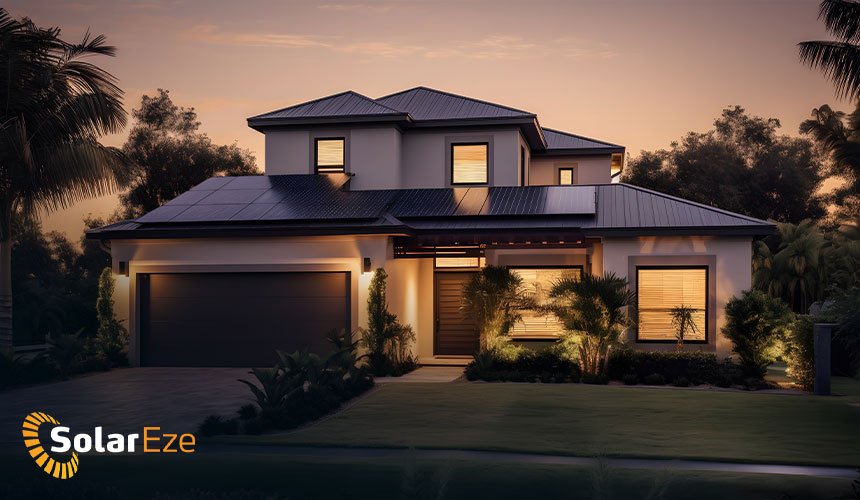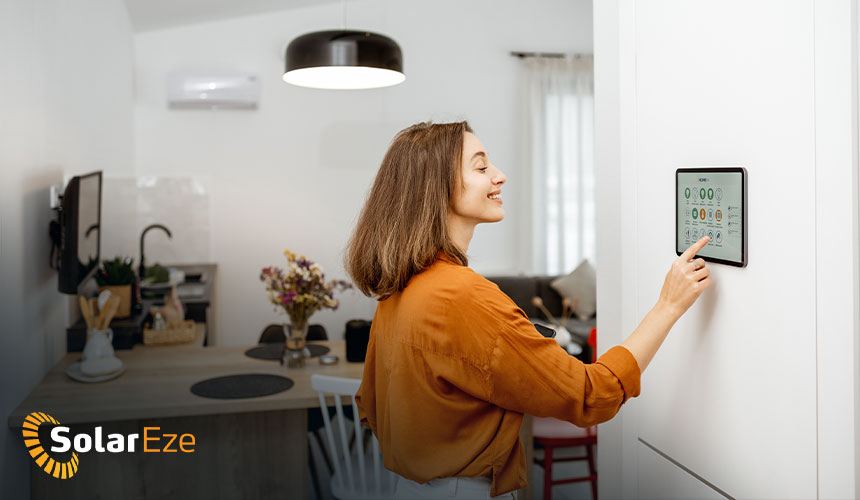How to Reduce Your Power Usage at Night
Slash your electricity bills at night! Discover practical tips to significantly reduce your power usage while you sleep.
15+ Years Experience
Financing Available
10 Years Warranty
CEC Qualified Installers
Understanding Power Consumption
Understanding your power consumption at night can really be an eye-opener, especially when you realise how much energy certain appliances and habits are using while you’re not even awake. Adapting energy-saving habits is a critical step towards reducing electricity costs at night. This involves being mindful of what’s plugged in or left on, from standby electronics to outdoor lighting.
Nighttime power-saving tips include turning off non-essential appliances and electronics completely, rather than leaving them in standby mode. You’d be surprised by how much this simple habit can save you over time! Additionally, consider scheduling high-energy devices to run during the day when solar energy production is at its peak.
Maximising solar energy usage not only reduces your reliance on grid electricity but also lowers your overall carbon footprint. It makes for more eco-friendly nighttime routines that benefit both your wallet and the environment.
By focusing on these practices, you can make significant strides in curbing excessive nighttime power usage. However, don’t stop there – the efficiency of your appliances plays a huge role too. The next section will delve into how choosing efficient appliances can further reduce your nighttime energy consumption.
Efficiency of Appliances
Consider the efficiency of your appliances and how they can make a difference to your energy consumption. Some devices in your home are notorious for being power-hungry, even when you think they’re off. These include televisions, computers, and coffee machines which consume energy while on standby mode.
Here are some energy-saving tips that could help reduce your nighttime usage:
- Turn off all electronics completely at the wall socket instead of using their remote control or power button.
- Unplug device chargers when not in use as they still draw power.
- Schedule high-energy appliances like dishwashers and washing machines to run during daylight hours.
- Manage hot water usage by showering earlier in the day when possible.
- Consider investing in a stand-by power controller that automatically switches off unattended entertainment systems.
By implementing these strategies, you can curb standby energy consumption significantly. Remember, every bit of energy saved not only reduces your electricity bill but also contributes to a more sustainable environment.
As we transition into exploring ways to further improve household efficiency, let’s delve into the importance of insulation and how it can play a pivotal role in maintaining an optimal indoor climate with less reliance on heating and cooling devices.
Importance of Home Insulation
You’ve got to appreciate the role of insulation in your home’s energy efficiency. The types of insulation materials available are many and varied, from traditional fibreglass batts to eco-friendly options like sheep’s wool or recycled denim. Each material has unique properties that make it ideal for different areas of the home.
The benefits of proper insulation extend beyond just keeping your home warm in winter and cool in summer. It can drastically reduce your reliance on heating and cooling appliances, decreasing your power usage at night and saving you money on electricity bills. For instance, insulating your roof can prevent heat loss through the roof, a significant source of energy waste.
Insulation installation techniques vary depending on the material used and the area being insulated. While some jobs might be DIY-friendly, others may require professional installation for maximum effectiveness. Finding cost-effective insulation options doesn’t have to be challenging. Although upfront costs can seem daunting, remember that quality insulation pays for itself over time through reduced energy bills.
As you consider ways to further decrease nighttime power consumption, don’t overlook smart lighting solutions – an effective strategy that completes an energy-efficient household picture.
Smart Lighting Solutions
Smart lighting solutions can make a huge difference in maintaining an energy-efficient home. They offer advanced features that can significantly reduce your power usage at night, without compromising comfort or convenience.
- Wireless controls allow you to adjust your lighting from any location in your house, or even remotely when you’re away. This ensures lights aren’t left on unnecessarily.
- Motion sensors eliminate the need for constant manual control by automatically turning off lights when no movement is detected for a certain period of time.
- Lighting timers enable you to pre-set the times when specific lights turn on and off, which is especially useful during nighttime hours when everyone’s asleep.
Investing in energy-efficient bulbs also plays a crucial role in cutting down electricity use at night. These bulbs consume far less power compared to conventional ones while providing the same amount of light output.
Additionally, smart home integration makes managing these systems seamless and effortless with the help of automated routines based on your lifestyle patterns.
As we move forward with ways to conserve energy during nighttime hours, let’s pivot into how temperature control strategies can further enhance our savings potential without sacrificing comfort.
Temperature Control Strategies
It’s crucial to strategically manage your home’s temperature for maximising energy savings, especially during evening hours. This can be achieved through a combination of smart thermostats, energy-efficient bedding and passive cooling techniques.
Consider investing in a smart thermostat that allows you to set specific temperatures for different times of the day. With the advent of technology, some models even learn your habits over time using artificial intelligence and adjust accordingly to save more energy. As night falls, they can lower or shut off your heating or cooling system while maintaining a comfortable indoor environment.
Next, look into energy-efficient bedding options such as thermal blankets and lighter summer quilts. These can help regulate body temperature without reliance on heaters or air conditioners at night.
Furthermore, use passive cooling techniques like ventilating rooms in cool evenings or using energy-saving curtains that limit heat gain during the day and retain warmth at night. Consider solar water heaters too; they store heated water from the daytime for use later in the evening.
By following these strategies, you’ll not only reduce your power usage at night but also contribute towards an environmentally sustainable future. Let’s now turn our attention to another critical aspect: optimising electronics.
Optimising Electronics
Believe it or not, making a few simple changes to how you use and manage your electronics can result in significant energy savings.
One of the key power-saving tips for electronics is to avoid leaving them on standby mode. Although it seems like they’re off, devices such as TVs, microwaves, and game consoles continue to draw power even when idle. This phenomenon known as ‘standby power consumption’ can account for up to 10% of your home’s total energy usage.
Consider investing in smart power strips which automatically cut off the electricity supply when devices are inactive or fully charged. These intelligent accessories provide an effective solution to minimising standby power consumption and help maintain an energy-efficient household.
Optimise your charging practices too; unplug chargers when not in use as they still consume energy even without a connected device. In fact, excess overnight charging could be detrimental to your phone’s battery lifespan.
As part of creating an ecosystem of energy-efficient home appliances, also consider replacing old gadgets with newer models that adhere strictly to energy-saving standards.
Next up, let’s delve into how monitoring your overall energy usage can further enhance these efforts towards achieving substantial night-time power conservation.
Monitoring Energy Usage
Keeping a close eye on overall energy consumption can significantly help in making informed decisions about when and how to use appliances for optimal savings. Smart thermostats and energy monitoring devices give you real-time data, enabling you to adjust your habits accordingly.
Here are some tips to consider:
- Invest in smart thermostats that allow you to program temperature settings based on the time of day, potentially reducing the amount of power used at night.
- Use energy monitoring devices that provide insights into which appliances consume the most electricity so you know where to focus your efforts.
- Enable power-saving modes on electronic devices like computers and televisions – these modes reduce energy consumption when the device is not actively being used.
- Opt for energy-efficient appliances when possible; they may be more expensive initially, but their lower operating costs will save you money in the long run.
- Adjust sleep mode settings on your computer or laptop – it can make a significant difference in reducing unnecessary power usage.
Remember, every small change contributes towards a greater purpose. By taking these steps, not only will you reduce your electricity bill, but also help conserve our planet’s resources.
Key Takeaways
- Schedule appliances to work during the day to maximise the use of solar energy.
- Turn off non-essential appliances at night to avoid unnecessary energy consumption.
- Use showers earlier in the day to reduce hot water usage during non-optimal solar energy production times.
- Turn off air conditioners at night and utilise insulation to maintain a comfortable temperature in the home.
Visit www.solareze.com.au to request a quote for your next solar installation and one of our friendly team members will contact you shortly. If you would like to talk to us immediately, call 0410 658 790 today and we will offer you a free solar consultation for your home.







No Comments